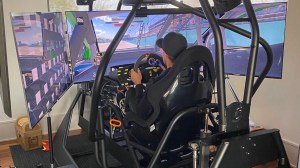
It was an innovative way to fill the void caused by the cancellation of sporting events amid concerns about the spread of COVID-19. NASCAR, one of the first sports organizations to tackle the unprecedented sports blackout, shifted gears to provide stock car racing fans with engaging new programming to fulfill their needs for speed.
The result was a 100-lap race at a virtualized Homestead Miami Speedway, which attracted top talent in terms of both drivers and broadcast announcers. Denny Hamlin took the checkered flag, narrowly beating Dale Earnhardt, Jr. in dramatic fashion following a collision just ahead of the finish line on the final lap.
According to Nielsen viewership data in the U.S. on the Fox Sports 1 broadcast:
- An average of 638,000 homes and 903,000 viewers (P2+) tuned in to the race, making it the most watched linear esports broadcast in history.
- 1.6 million unique viewers P2+ watched the broadcast for at least six minutes.
- These viewers tuned in for an average of 59.42 minutes, more than half of the 112-minute broadcast.
- The broadcast also exposed NASCAR to new viewers, bringing in 255,000 viewers who hadn’t yet watched a NASCAR Cup Series race in 2020.
Beyond broad television viewership, there was also significant social buzz during the race. According to Nielsen Social Content Ratings data:
- The March 22 virtual race was the most social TV program of the day on Twitter, generating 217,300 interactions and 912,500 video views.
- NASCAR drivers had a commanding presence during the televised race, accounting for nearly half (49%) of all owned Twitter engagement (across NASCAR, team, driver and media profiles) around the iRacing Pro Invitational Series broadcast, a much larger share than during live NASCAR Cup Series races.
This speaks to the potential of virtual events and esports to capture the attention of fans and provide new opportunities for rights holders, teams and sponsors. What was a truly collaborative endeavor across the entire NASCAR ecosystem succeeded in paving new ways for brands and advertisers to engage fans.
“Esports and virtual sports competitions represent promising new opportunities for traditional sport leagues and teams to engage their core fans while also delivering value to sponsors,” said Jessica Forrest, Group Vice President at Nielsen Sports. “During a time when traditional live sports are at a standstill, NASCAR is one of the few sports whose athletes can still actively compete by doing what they do best—race. And the success of last weekend’s iRacing debut on live television demonstrates that sports fans are ready to consume sports in new, innovative ways.”
On the heels of the successful Homestead Miami Speedway iRacing event, Fox Sports and NASCAR have committed to airing additional iRacing Pro Invitational Series races this season. The next broadcast will be this Sunday, March 29 when drivers will fire up their race simulators again, this time to tackle the virtual Texas Motor Speedway. And Nielsen Sports will be watching the viewership and social content numbers closely.
Header photo courtesy of NASCAR.


